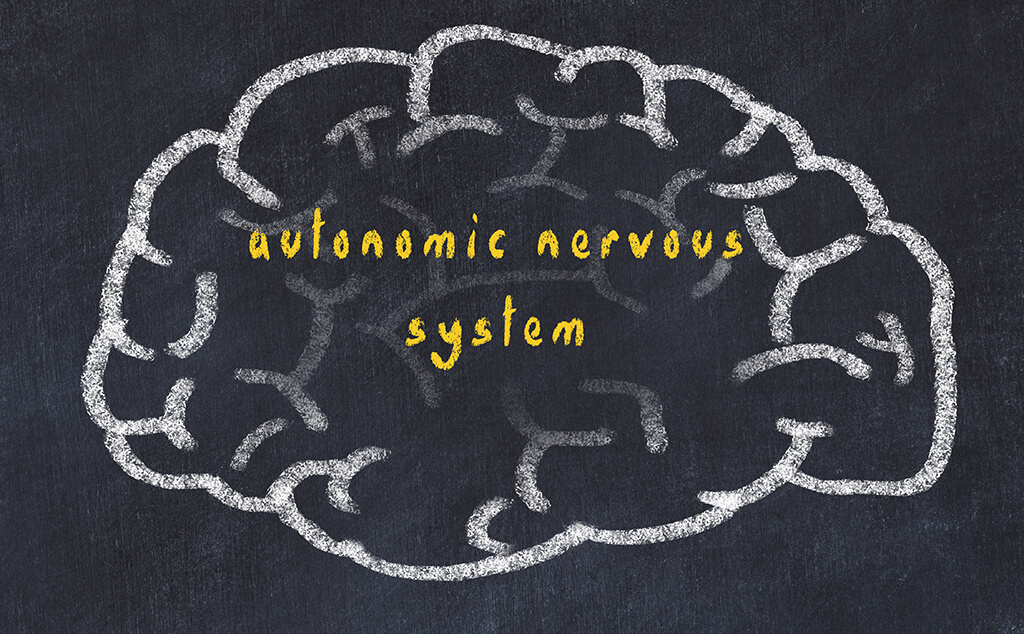What is the Autonomic Nervous System?
The autonomic nervous system (ANS) connects your brain to various parts of the body, including your organs. It automatically regulates your heart rate, breathing, temperature, and digestion.
Autonomic refers to the automatic/involuntary nature of the nervous system. The ANS has two parts – the sympathetic and the parasympathetic nervous system. The sympathetic nervous system triggers the fight or flight response during a threat, and the parasympathetic nervous system restores the body to a calm state.
When these two systems get out of balance, it can have serious consequences for your health. Autonomic nervous system dysfunction can be caused by injuries, emotional trauma, or nutritional deficiencies. Nerve damage can also occur as a result of a cardiometabolic disease such as diabetes. Autonomic nervous system dysfunction is also known as dysautonomia.
What causes Autonomic System Dysfunction?
Diabetes is the most common cause of autonomic nervous system dysfunction, particularly when it is not well managed. Other potential causes of ANS are:
- Autoimmune diseases such as rheumatoid arthritis and celiac disease
- Chemotherapy medications
- Bacteria and viruses, including Covid-19 and HIV
- Abnormal protein build-up
- Inherited disorders
What are the Symptoms of Autonomic Dysfunction?
Because the nervous system influences so many bodily functions, there are many symptoms that might indicate an autonomic nerve disorder. Some of the more common symptoms include:
- Dizziness/fainting (Orthostatic hypotension)
- Digestion problems (bloating, diarrhea, difficulty swallowing)
- Urinary issues (Incontinence, incomplete emptying)
- Sexual problems (Erectile dysfunction, inability to achieve orgasm)
- Blurred or tunnel vision, dry eyes
Common Autonomic Disorders
Common autonomic disorders include Orthostatic hypotension, Postural Orthostatic Tachycardia Syndrome, and Neurocardiogenic syncope (NCS).
Orthostatic Hypotension
Orthostatic hypotension is a sudden drop in blood pressure when you stand up from a seated or lying down position. This blood pressure drop can make you dizzy or even faint. We all encounter this physical symptom from time to time, but regular dizzy spells can indicate possible neurological or endocrine problems. Some of the simple measures that can help orthostatic hypotension include:
- Elevating your head while sleeping
- Drinking more fluids
- Adding salt to your diet
- Compression stockings
Postural Orthostatic Tachycardia Syndrome
Postural orthostatic tachycardia syndrome (POTS) also causes light-headedness when standing up and a rapid increase in heart rate. Most POTS patients are females aged 13 to 50 years old. The condition can be brought on by a viral illness or a severe infection because the body cannot regulate blood vessel squeeze and the heart rate response properly. Some simple lifestyle changes I recommend to patients dealing with POTS is to drink water regularly, as increasing water intake is proven to increase your standing blood pressure levels. I also advise patients to eat smaller, more frequent meals. Large meals direct more blood flow to the digestive system, pulling it away from the heart and upper body and increasing the likelihood of dizziness and fainting.
Neurocardiogenic syncope
Neurocardiogenic syncope (NCS) is also called vasovagal syncope. NCS is a common cause of fainting, due to a sudden slowing of blood flow to the brain. The trigger for this fainting spell could be dehydration, standing for long periods, emotional shock, or intense pain. Generally, this condition doesn’t have serious long term effects, apart from the risk of injury when fainting! However, frequent fainting could indicate diabetes or Parkinson’s disease, and I strongly advise my patients to undergo some tests to exclude other possible heart or nervous system disorders.
Peripheral Neuropathy
Peripheral neuropathy results from damage to the nerves in the hands and feet, causing weakness, numbness, and pain. Causes can include diabetes, injuries, metabolic problems, infections, and environmental toxins. The symptoms relate to the type of nerve affected, which can be sensory (touch, temperature), motor (muscle movement), or autonomic (blood pressure, heart, digestion). Diagnosis may involve tests such as a nerve biopsy or a C.T. scan to make sure nothing is pressing on a nerve. Natural treatments can include vitamin supplements, acupuncture, and diet modification.
How is Autonomic Dysfunction Diagnosed?
Autonomic nervous system dysfunction is also known as autonomic neuropathy, and patients with symptoms can be tested for the condition in several ways:
- Autonomic function tests measure heart rate and blood pressure while undertaking exercises
- The Tilt-table test measures your body’s response when your upper body is raised
- Gastric-emptying tests check for digestion issues
- The thermoregulatory sweat test maps your sweat patterns
- Ultrasound scans of the bladder and urinary tract.
Treatments for Autonomic Dysfunction
While it’s important to address the immediate symptoms of autonomic dysfunction, my goal is to find the underlying problem and develop solutions to manage the condition successfully. Creating a healthy approach to living is vital to ensure successful management of an autonomic dysfunction, and I recommend the following strategies:
- Manage blood sugar levels
- Quit alcohol and smoking
- Stabilize your blood pressure
- Lose weight if required
- Exercise the mind and body
Digestive Disorders
Functional gastrointestinal disorders have a strong connection to the autonomic nervous system. Digestion is regulated by the enteric nervous system (ENS), often called the ‘second brain.’ The neurotransmitters in the ENS sense when food enters the gut and manage the digestion process, sending signals back to the central nervous system. Functional gastrointestinal disorders such as IBS occur when this brain-gut axis is disrupted, causing issues with:
- Motility (how fast or slow the G.I. tract functions – resulting in diarrhea or constipation)
- Sensation (Patients experience heightened pain as the nerves become over-sensitive)
- Stress (Triggers in the gut set off stress levels in the brain)
As a functional medicine practitioner, I look outside the realm of traditional medicine for natural therapies that can play a vital part in treating autonomic nervous system dysfunction. It is well recognized now that diet, lifestyle, and mental health can significantly influence the recovery process. More and more research into nutraceuticals confirms the supportive role they can play in a treatment program. For example, alpha-lipoic acid is an antioxidant that is showing positive results as a supplement to help repair nerve damage caused by diabetes.
But functional medicine is not just about supplements and diets. A big part of the consultation is about spending quality time with my patients to hear their stories. Through this process, I help them connect the dots between their health issues and how they often relate to significant life events. Are you ready to take control of your healing?





